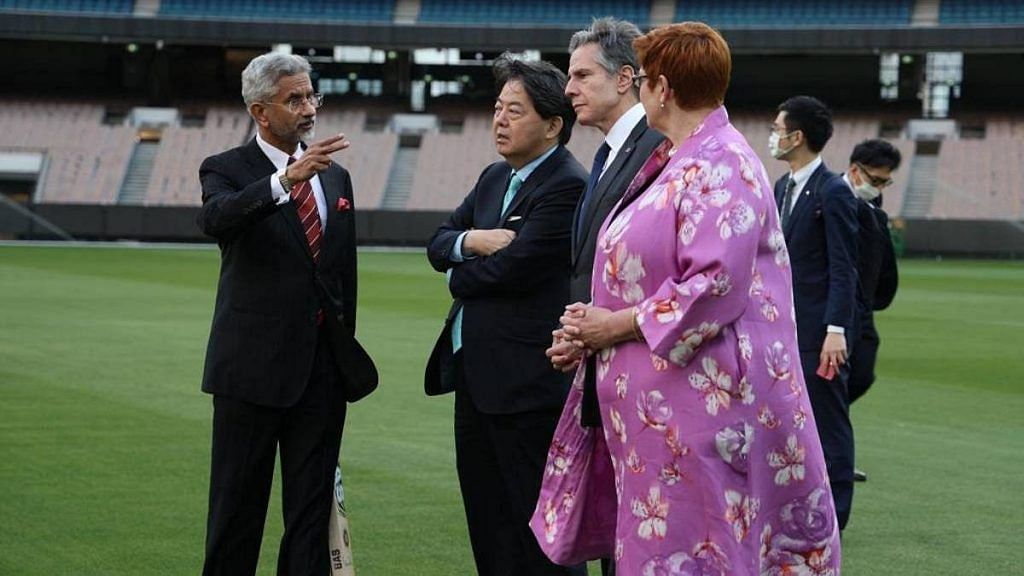New Delhi: The Ukraine war may result in collateral damage for India, as New Delhi carefully maneuvers its position within the Quadrilateral Security Dialogue, popularly known as Quad. The three other Quad countries — the US, Australia and Japan — have spoken in unison while calling out Russia and its President Vladimir Putin’s “special military operation” on Ukraine, have imposed stringent sanctions against Moscow.
While New Delhi has its own reasons in not criticising Moscow publicly, the collective criticism of Putin’s actions is likely to push Russia closer to China, which might induce the Quad to also take a firm stance on Moscow. But New Delhi’s “indifference” over the issue may prove to be creating a “rift of sorts” for the grouping, diplomatic sources told ThePrint.
Initial signs of differences over Ukraine could already be witnessed in the last round of Quad foreign ministers meeting, held in Melbourne earlier this month.
As the meeting concluded at the Australian capital, US Secretary of State Antony J. Blinken, Australia Foreign Minister Marise Payne and Japanese Foreign Minister Yoshimasa Hayashi all spoke about the crisis that was rapidly developing then between Russia and Ukraine. The only exception was India’s External Affairs Minister S. Jaishankar.
It was due to India, sources said, that the mention of Russia-Ukraine crisis was also dropped from the joint statement that was issued after the meeting was over. However, at that time it had seemed as if the crisis would be averted, even as the international community — especially France and Germany — pushed for a resolution under the Minsk Agreements and Normandy Format.
Russia is New Delhi’s decades old partner and continues to be India’s biggest arms supplier.
Also read: Not 1st time India abstained in vote against Russia. It’s about Delhi’s own security interests
India in the UN
The cracks within Quad face the danger of widening further, with India’s decision last week to abstain from voting at the UN Security Council, for a resolution against Russia because of its actions against Ukraine.
On Monday, the United Nations called for a rare emergency special session of the UN General Assembly (UNGA), even as India chose to abstain again on the procedural vote that sought to convene a rare special session by the body.
This was the second time when India decided to abstain at the UN from voting on the Russia-Ukraine issue.
Moreover, India has also steered clear from the range of stringent economic sanctions that the US, Australia and Japan have imposed on Russia.
“In Melbourne it became clear what stance India will take, which is why I believe we refused to go along with the other countries and hence there was no mention of the Russia-Ukraine crisis in the joint statement. But that was before the war began, although the pressure was mounting,” said Rajiv Bhatia, former diplomat and an expert on the Indo-Pacfic.
Bhatia added: “But at the same time, India will need to adhere to its position it needs to keep pushing for what New Delhi has been saying at the UN. Also, we do not know what is being conveyed privately but let’s see how this pans out. But certainly, within Quad there is tension over Ukraine now.”
Bhatia, now Distinguished Fellow at the Gateway House, also said, by the time the next round of Quad Summit takes place, “it will be clearer what course this (Ukraine) war will take”.
The Quad Summit, which last took place in September 2021, will next take place in Japan in late Spring.
‘Not an Asian-NATO’
External Affairs Minister Jaishankar, during his address at the Munich Security Conference earlier this month, had stressed that the “Quad is a grouping of four countries who have common interests, common values, a great deal of comfort, who happen to be located at four corners of the Indo-Pacific, who found out that in this world no country, not even the US, has the ability to address global challenges all on their own.”
Dismissing claims that the grouping is an Asian-NATO organisation, he said, “I would urge you not to slip into that lazy analogy of an Asian-NATO. It isn’t because there are three countries who are treaty allies. We are not a treaty ally. It doesn’t have a treaty, a structure, a secretariat, it’s a kind of 21st century way of responding to a more diversified, dispersed world.”
However, it is amply clear to the world that the main objective behind reviving the Quad grouping in 2019 from its older avatar was mainly to counter China’s growing belligerence in the Indo-Pacific region. And, now with the Ukraine war reaching its peak, Russia and China is going to be closer, said sources.
“Russia is indeed one of the few geopolitical issues on which the Quad members don’t agree. Initially, this divergence could be overlooked given that the Quad doesn’t directly relate to Russia. Putin’s invasion of Ukraine makes the Russia issue more difficult to avoid within the Quad, not just because it amplifies how India’s position differs from the other Quad members, but also because the war in Ukraine is likely to strengthen an already warm Russia-China relationship,” said Michael Kugelman, deputy director and senior associate for South Asia at The Wilson Center, a Washington-based think tank.
He added, “Moscow’s opposition to the Quad will grow more stark. The Quad will continue to revolve around countering Chinese power, but Russia’s increasing closeness to China means it will indirectly be about countering Russia as well. And this puts India in a terribly difficult diplomatic bind.”
Moscow has repeatedly criticised the Quad calling it a US-led “persistent, aggressive and devious” policy.
(Edited by Poulomi Banerjee)
Also read: India sending teams from Moscow, alerts Red Cross to evacuate students from Kharkiv, Sumy
